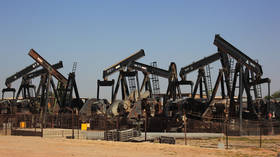Oman looks to make the most of its dwindling oil reserves

Oman has just established a new state-owned company for upstream oil and gas operations to help garner investment interest and further develop its resources.
Energy Development Oman (EDO) will have a stake in the majority state-owned Petroleum Development Oman (PDO) as well as developing independent projects. EDO will be primarily focused on Oman’s biggest oil field in Block 6, which currently produces 650,000 barrels per day (bpd).
Also on rt.com Bringing water to Wall Street may spark bubble for the world’s most vital resource, UN warnsThe company can attract funds independently as part of a plan to raise debt. They will “undertake hydrocarbon exploration and production operations” according to a government gazette announcement on Sunday. In addition, EDO will work in the fields of enhanced oil recovery, low carbon technologies, and solar thermal energy.
Major Oman producer PDO is 60 percent owned by the Omani government, with Royal Dutch Shell, Total, and Partex splitting the rest. To date, PDO has 192 oil fields, 52 gas fields, 29 production stations, and approximately 9000 active wells.
The EDO model is expected to encourage others in the Middle East to follow suit. Oman decided to raise funds independently through EDO to tackle its mounting budget deficit, a model that could be replicated in state-dominant oil nations.
Also on rt.com Time for record global oil demand may have already passed, Russia saysThe company is expected to issue up to $3 billion of bonds in the first half of 2021, according to a Bloomberg source. As part of this plan, JPMorgan Chase & Co. is advising the government on the best moves forward.
PDO Managing Director Raoul Restucci said of the establishment of EDO earlier this year, “EDO will be a holding company of PDO and a number of investments. For PDO, it will enable us to corporatize the entity and thus enable us to secure the funding and resources which the government at the moment is securing for us at a very high cost. We will be able to deconsolidate that debt and secure it at substantially more attractive terms… EDO is also about energy transition as well. We have a number of businesses, a number of investments that are very keen to partner with us.”
Read more on Oilprice.com: World oil demand hits two-month high
Oman is the largest non-OPEC oil producer in the Middle East region, providing the Omani government with 76 percent of its total revenue in 2019. In September this year, Oman’s oil production stood at 718,700 bpd, a 0.18 percent decrease month-on-month from August. The reduction in the country’s oil production comes following the 2020 decrease in demand for the commodity, which hit the whole Middle East region hard and led to OPEC and Oman agreeing to cut production until the end of the year.
Also on rt.com OPEC+ finally reaches deal on 2021 oil output cutsOman is generally experiencing a slowdown in oil production due to its limited reserves. Current reserves stand at 4.8 billion barrels of oil equivalent. This would provide Oman with a further 25-30 years of crude production at 2019 levels. Enhanced oil recovery techniques could, however, help combat the difficulty in accessing existing reserves, according to a Ministry of Finance prospectus from October.
This introduction of ELO and the anticipated increase in the demand in 2021 is expected to stabilize Oman’s oil production and revenue going into 2021. In addition, greater investment in the country’s reserves could promote greater diversification away from state ownership across the region.
This article was originally published on Oilprice.com












